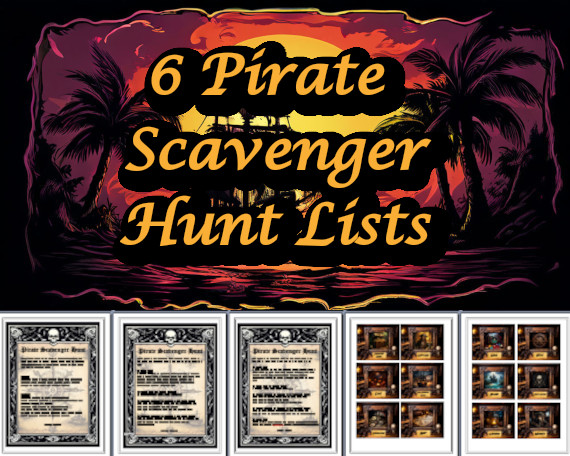
Scavenger Hunts
So, why are we having a whole section on Scavenger Hunts when our website is devoted to Treasure Hunts? Often times the words scavenger hunt and treasure hunt are erroneously interchanged. For a full description of the two and how they differ from each other, visit our post here: TREASURE HUNTS VS SCAVENGER HUNTS. If after reading the difference between the two you find that you were actually looking to plan a Scavenger Hunt, we've provided a short section and resource to make sure that you were taken care of, as well!
 |
6 Pirate Themed Scavenger Hunt Lists - Download them all now! With six different lists to choose from, you won't have any trouble finding the perfect activity you'd like to plan. There's even a for prereaders (with images only.) High quality images are also included that can be printed and hidden so that your scavenger hunt can be set up just about anywhere. Photo hunt options, bonus points and even a couple puzzles thrown in. You'll find the list that's just right for you! CLICK HERE TO DOWNLOAD THEM! |
Although there are many different types of scavenger hunts one can create
and organize, they can be grouped into a few different categories:
ITEMS TO COLLECT - This is perhaps the most traditional type of scavenger
hunt where the participants begin with a list of items that they must
acquire within a certain time frame. The lists can vary and even be encrypted,
but the format remains the same. There are also two different ways to
collect the items. The first is to have it open where the participants
are able to collect the items in any way they'd like. The other is to
have specific items that the participants must find - once one team finds
the item, nobody else can obtain that item.
PICTURES TO TAKE - In this type of scavenger hunt, rather than collecting
items to turn in at the end of the hunt for points, the participants must
take a variety of specific photos detailed on a list of some sort.
TASKS TO COMPLETE - Scavenger Hunts within this format require specific
tasks to complete. This particular format is the most 'open' and can include
any number of tasks.
To visit our Scavenger Hunt FAQ Page (Frequently Asked Questions) - click
HERE.
We currently have several themed Scavenger Hunt list collections available
for immediate download. Each collection has a few different lists to choose
from depending on the type of scavenger hunt you'd like to plan. To see
our complete collection of downloadable Scavenger Hunt Lists, click HERE.
Scavenger Hunt FAQs
To see our complete collection of downloadable Scavenger Hunt Lists, click
HERE.
Below are some frequently asked questions among those that want to plan
a scavenger hunt:
Q: How many items should a 'good list' have?
A: This can be a tricky question because it depends on a few factors.
The biggest factor is the question of how long you'd like the actual Scavenger
Hunt to last. If the list is too short then you run the risk of the participants
running out of items to find before the time allotted. However, if the
list is too long then it can be overwhelming and rob some of the fun from
the overall activity. As a general rule of thumb (and this is VERY general),
try to keep it so that it's reasonable for the teams to complete roughly
two thirds of the list in the time allotted. In this way they will feel
like they'll have to really work to get the job done, but be able to look
back and see that they completed more than half the list.
Q: How long should a scavenger hunt last?
A: Of course, there isn't a hard rule for this, either. However, there
are two considerations you should have when choosing the window of time
to complete the scavenger hunt list. The first is the energy of the participants
and what you are asking from them. Participants who are driving to locations
will have more energy than those who are running from location to location.
Age also matters, too, needless to say (but we're going to say it, anyway.)
The second is a little harder to judge but you should consider how 'interesting'
your scavenger hunt is. Simple scavenger hunts can run the risk of being
a bit tedious and almost resemble errands or chores. The more interesting
your scavenger hunt list is, the longer you can expect your participants
to ENJOY it (which, of course, is the goal, right?) As soon as they stop
enjoying the hunt, it's time to pull them in!
Q: If you want to have teams, how big should the teams be?
A: Different dynamics are created when different groups and numbers of
people get together. Sometimes the combinations work and sometimes they
don't. This is when you'll need to decide how best your PARTICIPANTS will
want to be grouped. If they are feeling good about their group, they will
be more likely to be engaged in the activity. When forming groups, it's
wise to keep two things in mind, though. First, it's best to avoid the
number three. The dynamic of two people in a conversation is very strong
and can create third wheels in each group. The second is considering spreading
out the A-type personalities among different groups. Scavenger hunts are
different from a basic treasure hunt in that scavenger hunt allows for
more strategy and open decisions to be made. Every group should have a
leader…but perhaps only ONE leader.
Q: How do I keep people from speeding / driving dangerously (if the participants
will be driving)?
A: This is a handy trick when dealing with car rallies or any other similar
activity. Group all of the teams before they leave. Pass out envelopes
to each driver. EVERY member of the team must remove their driver's license
from their wallets/purses and put them in the envelope for their team.
The envelopes are then to be sealed (verify so.) Instruct the teams that
these envelopes must remain in the glove compartments of the car they
are driving. You see, if anyone gets pulled over for, oh we don't know…let's
say speeding…then they will need to TEAR OPEN the envelope to give
the license to the police officer. Any team that returns at the end of
the hunt with an opened envelope will reveal that they were breaking a
law. If you explain this well enough to your participants, you won't have
any trouble!
Q: How do I collect the items and keep track of the score?
A: This one can be tricky depending on the types of items you have on
your list. Unless you only have one team on the hunt, it's best to think
ahead and recruit someone to help with this process as it can be a bit
time consuming. It might be best, also, to let all of your participants
fully know that points will be awarded at YOUR discretion - sometimes
teams will get creative on their items that only partially fit the description.
A rule of thumb is that if you go easy on one team that didn't follow
the rule, you'll irk every team that DID follow the rule.
Q: I have a hundred people participating - what if everyone leaves at
once and there's mayhem?
A: A little mayhem is ok…but not if everyone is driving out of the
same parking lot at once. Consider these options:
~ Have two sets of teams go out at different times. Stagger the groups
by 5 minutes each. Keep track of what teams went out when so that they
are awarded extra time appropriately for their list. Also make sure that
the teams DO NOT get to see their list until they actually leave (to keep
it fair, strategy-wise.)
~ Begin your scavenger hunt with an activity - when the teams complete
the activity successfully, they will be given their list and can leave.
~ Send the teams out in different directions…then TEXT the list once
everyone has left the parking lot! (Of course, this will only work if
every team has a text facilitating cell phone.)